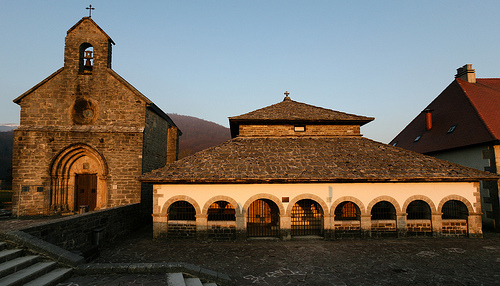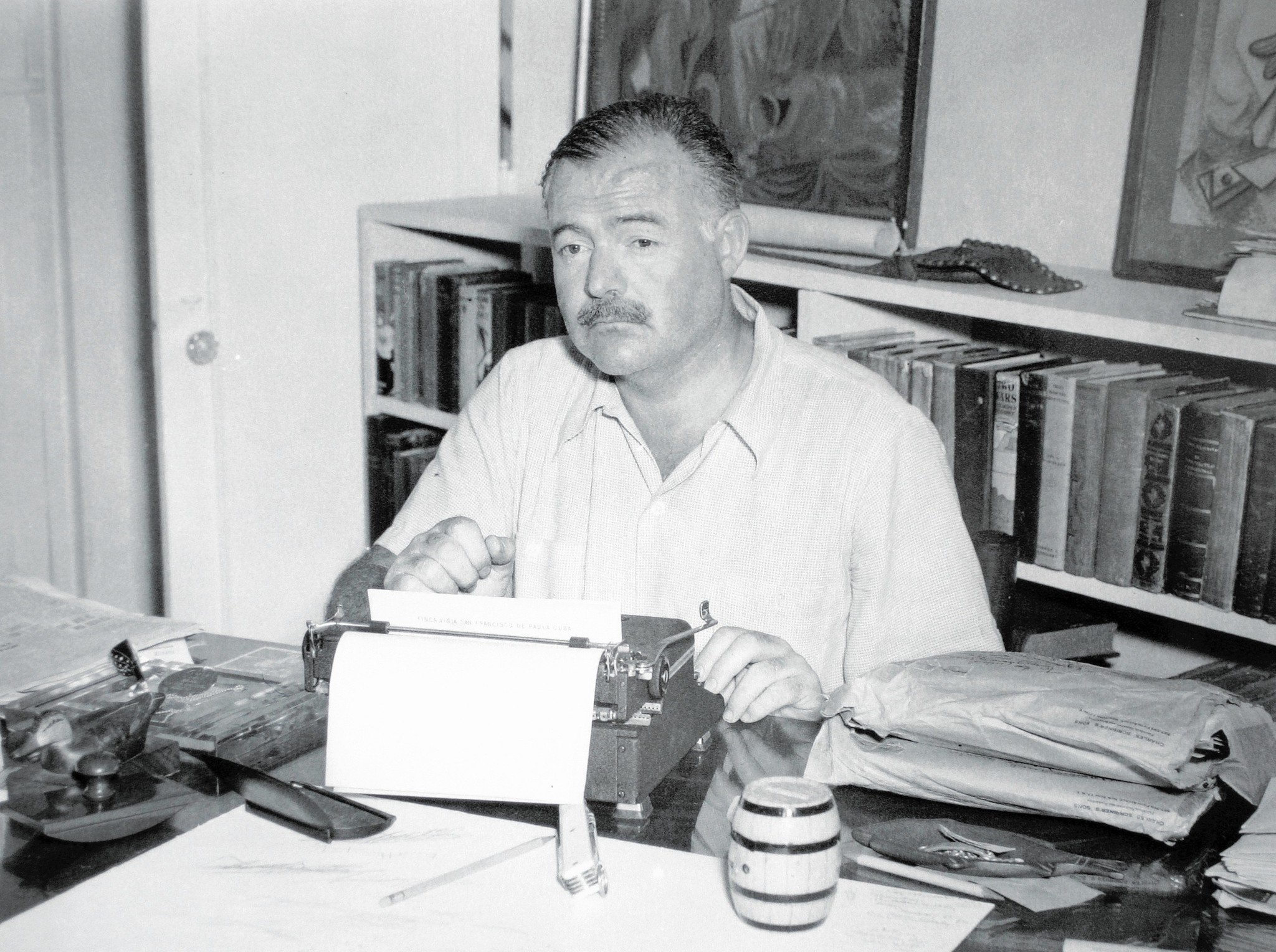chapter11.2--handout
Background Information
法国传奇英雄罗兰
...and away off on the shoulder of the first dark mountain was the gray metal-sheathed roof of the monastery of Roncesvalles.(在远处第一座黛色的山岗上,闪现出龙赛斯瓦利斯的修道院的灰色铁皮房顶。)
这里提到了西班牙巴斯克地区的一个地方——龙赛斯瓦利斯Roncesvalles(在法语中名称为Roncevaux). 龙赛斯瓦利斯处于比利牛斯山脉南麓一个山隘旁边,在潘普洛纳的东北。这里曾经发生过一场著名的战役。公元778年,法兰克王国的查理曼进军西班牙和伊斯兰教王打仗。在回法途中,其后卫部队在龙赛斯瓦利斯附近河谷遭到山地土著居民的袭击。传说中的英雄罗兰在此役中战死。

据说这座修道院里面还有罗兰的遗物,由此也称为著名的朝圣地。

罗兰(Roland)是当时查理曼大帝(Charlemagne the Great)麾下的12圣骑士的首席骑士,史上第一位被称作“帕拉丁(即圣骑士)”的人。拥有无可挑剔的美德。法兰西时代可与亚瑟王相比的骑士。为短暂而辉煌的查理曼帝国的创立立下了不朽的功勋。
但罗兰作为文学作品中的重要象征,已经超过了他在历史当中的地位。他代表的是一种传奇式的英雄形象(所谓的“骑士精神”的彰显)——虔信宗教、忠君爱国、勇敢坚强、珍视友谊。另外扑克牌里的方块J(J即Jack,表示“侍从”)其实就是罗兰骑士本人哦~

罗兰手里握着的是一把“神剑”(Durandal “迪朗达尔”),有“恒久不变”之意。据说罗兰是从天使那里得来了这把剑,天使要他献给国王,罗兰照办了。查理曼大帝有感于他的诚实,就把此剑赐给他,命他守护在自己身边,而罗兰也发誓永远效忠于国王。
Vocabulary
rolling
adj. 波动的;起伏的(rolling hills have many long gentle slopes)
原文:We went through the forest and the road came out and turned along a rise of land, and out ahead of us was a rolling green plain, with dark mountains beyond it.
我们穿出树林,公路顺着一个山坡拐弯,前头是一片起伏的绿色平原,再过去是黛色的群山。
💧这里的rolling形容群山“连绵起伏的”;rolling还可以引申为“定期(不断更新)的”(subject to regular review and updating), 比如:We are making a rolling plan for overseas development.
我们正在制定一个会定期更迭的海外发展计划。
tumblerful
n. 一杯的量(the amount of liquid that this type of glass can contain)
原文:I went over to the cupboard and brought the rum bottle and poured a half-tumblerful into the pitcher.
我走到食柜前,拿了一瓶朗姆酒,往酒罐里倒了半杯。
💧tumbler 原本指一种平底的无柄酒杯(a glass with a flat bottom and no handle), 这里tumblerful就是指“一个平底酒杯的量”。
💧tumbler 也可以指“不倒翁”哦~(tumble作动词有“翻滚,摔倒”的意思)
Crush Your Problems
1、The country was barren and rocks stuck up through the clay.
山地荒芜贫瘠,大小岩石破土而起。
💧表达精讲
stick up 有“向上突起,竖起”(points upward above a surface)的意思,这里指岩石向上穿破土层(through the clay)而起。我们再来看一个例句:Why is the worst-looking flower sticking up above all the rest?(为什么这朵奇丑无比的花在花丛里如此突出显眼?)
以及在电影或小说中,拿着枪威胁一个人说“举起手来”就是说“Stick ‘em up!”哦~
2、Making the horizon were the brown mountains.
褐色的群山同天际相连。
💧表达精讲
这里是一个倒装句,还原为正常语序就是The brown mountains were making the horizon. horizon表示天和地的分界线”(skyline). 这句话直译是“褐色的群山成为了天际线”,其实就是在形容远远望去,褐色群山仿佛和天际相连的样子。
3、As the bus ground slowly up the road we could see other mountains coming up in the south.
随着汽车沿公路吭哧作响地缓慢攀登,我们看到另一些山峦出现在南边。
💧表达精讲
①ground 的原形是grind, grind 本身有“研磨”的意思,还可以形容“(因为摩擦而)吭哧作响地移动”(to move with noisy friction),比如:A train grinds along rusty rails.(火车在生锈的铁轨上吭哧作响。)这里也是同样的意思,汽车沿公路缓慢攀登时(slowly up the road)发出吭哧轰隆的声音。
②other mountains coming up in the south 形容的就是随着汽车往上攀登,南边的山峦也慢慢出现在视野中(rising on the horizon).
4、As we came to the edge of the rise / we saw the red roofs and white houses of Burguete ahead / strung out on the plain, / and away off / on the shoulder of the first dark mountain / was the gray metal-sheathed roof of the monastery of Roncesvalles.
当我们来到山坡的边缘,我们看见前边平原上布尔戈特的一连串红顶白墙的房屋,在远处第一座黛色的山岗上,闪现出龙赛斯瓦利斯的修道院的灰色铁皮房顶。
💧表达精讲
①rise 指“一段爬升平缓的小山坡”(a gently sloped hill),这里的the edge of the rise其实也就是指山坡的顶端;
②strung out on the plain 是过去分词结构作后置定语,表示“在平原上排成一串(列)”;string可以表示“用(线,链)穿起来”,而sth be strung (out) along/across 就是“沿着……排成一列”的意思,比如:The houses and shops were strung out along the bay.(住宅和店铺沿海湾排成一行。)
③away off 相当于way off, 都是表示“距离很远,在远处”的意思;
④shoulder 在这里指“山肩”;shoulder一般可以用来形容弧线形区域,比如公路上的紧急停车带,也就是所谓的“路肩”也是用shoulder来表示哦~
⑤metal-sheathed 相当于metal-roofed, 表示“铁皮房顶的”;sheath本来是指“(刀或剑的)套,鞘”(a case for a knife or blade), 作动词一般写作sheathe, 除了表示“将(刀或剑)插入鞘中”,还可以用被动态表示“被……覆盖,笼罩的”,比如:The grassy hills were sheathed in mist.(绿草如茵的群山雾气弥漫。)
Content Analysis
Jake和Bill在到达布尔戈特(Burguete)后住进了一家小旅馆里,除了天气非常寒冷以外,让他们心生不快的还有另一件事,就是旅馆的老板以旺季为由向他们收取了高价的费用。这一段的人物互动也有非常值得琢磨的地方,比如语言留白处入木三分的动作描写——
💧Clue 1: Dialogue is more than what's said in conversation.
Evidence 1: I went out to find the woman and ask her how much the room and board was. She put her hands under her apron and looked away from me.
"Twelve pesetas."
我出去找女掌柜,问她食宿费每天要多少。她把双手插在围裙下面,连望也不望我一眼。
“十二比塞塔。”
Evidence 2: "Why, we only paid that in Pamplona."
She did not say anything, just took off her glasses and wiped them on her apron.
“怎么,在潘普洛纳我们也只花这么多钱。”
她不做声,光是摘下她的眼镜,在围裙上擦着。
这一段也足见作者在长句的把握上非常出色,读起来毫无冗赘和拖沓的感觉,大家可以也可以再细细地品味哦~
在海明威看来,所谓的“人物对话”不仅仅是语言上的,更多的是没有说出来的那部分(通过肢体动作或表情来表达的):Dialogue is more than what is said between characters in conversation; dialogue is what's not said. 比如这里女掌柜“手插围裙”以及“擦眼镜”的动作都透露出了她逃避躲闪的心态(知道自己做的是不诚信的生意)。
面对自己遭遇的不公,Jake虽然表面上不做声响,但却暗暗地找到了补偿,或者说是让自己心理平衡的方法——
💧Clue 2: Jake tries to compensate for the overcharging.
Evidence 1: "There isn't too much rum in that."
I went over to the cupboard and brought the rum bottle and poured a half-tumblerful into the pitcher.
"Direct action," said Bill. "It beats legislation."
“这里头没多少朗姆酒啊。”
我走到食柜前,拿了一瓶朗姆酒,往酒罐里倒了半杯。
“好一个直接行动,”比尔说。“比申请批准强啊。”
Evidence 2: We did not lose money on the wine, and the girl was shy but nice about bringing it. The old woman looked in once and counted the empty bottles.
我们在酒钱上没吃亏。女孩很腼腆,但是愿意给我们拿酒。老太太来看过一次,数了数空酒瓶。
“补偿”(compensation)这个主题其实贯穿了整个小说。比如这里Jake因为被敲竹杠心有不甘,于是在酒水上想要得到补偿(可以推测酒水钱应该是包含在房费里的)。但与之形成对比的是,尽管这一件小事上Jake找到了平衡,但在其他更重要的方面,他却深刻意识到生活其实没有公平而言(比如就他参战受伤这件事)。
Today's Bonus
💧海明威的写作忠告
在这几天的课文理解当中我们分析了不少海明威的写作理念和手法。海明威作为20世纪最著名的小说家之一,影响了后来不少作家的写作风格,比如《麦田里的守望者》的作者J. D. 塞林格。
海明威本人深得简洁优美文风的创作要领,而simplicity也可以说是英语这门语言在写作中的灵魂所在了。所以今天的彩蛋就为大家准备了海明威对于写作这件事的一些金玉良言,希望对大家也有一定的帮助哦~

1. Cut Out the Ornamentation 去掉所有的修饰
"If I started to write elaborately, or like someone introducing or presenting something, I found that I could cut that scrollwork or ornament out and throw it away and start with the first true simple declarative sentence I had written."
“一旦我开始要添枝加叶地修饰句子,就像一个人在介绍或者展示某个东西,我就会发现我其实可以把那些花里胡哨的东西都去掉,然后重新从我起初写的最简单的陈述句开始写起。”
海明威提倡用最简单的词汇表达最复杂的内容,比如他喜欢用基本词汇、简短句式等表达具体含义,用名词、动词来揭示事物的本来面目,丝毫无矫揉造作之感。在海明威看来,写作者完全没有必要用文字修饰雕琢来哗众取宠,只要将事物描述清楚就行。
2. Don’t Repeat Yourself 不要重复自己
"This book began magnificently, went on very well for a long way with great stretches of great brilliance and then went on endlessly in repetitions that a more conscientious and less lazy writer would have put in the waste basket."
“试想一本书有一个非常棒的开头,并且中间的部分也写得精彩绝伦,但是之后的内容就变成了没完没了的重复……一个稍微有点良心,或者说没那么懒惰的作家,是绝对不会这么做的;相反,他会这些全部都撕下来扔到垃圾篓里。”
3. After You Write, Read 把自己写的读一遍
“When I was writing, it was necessary for me to read after I had written. If you kept thinking about it, you would lose the thing that you were writing before you could go on with it the next day.”
“当我在写作的时候,把自己写的东西再读一遍是必不可少的环节。如果你只是去想,而不是去读的话,你很容易搞混一些东西,比如丢了关键的线索等,这样第二天你就没法继续往下写了。”
4. Never Empty the Well of Your Writing 不要一下子就把才思用完
"I had learned already never to empty the well of my writing, but always to stop when there was still something there in the deep part of the well, and let it refill at night from the springs that fed it."
“我早就学会的一件事是:永远不要一下子就榨干了自己的才思。每当我感觉自己的创作灵感里还有更多可以挖掘的时候,我都会停下来,并且等待它再一次充盈。”
5. Let the Pressure Build 给自己一些压力
"When I had to write it, then it would be the only thing to do and there would be no choice. Let the pressure build. In the meantime I would write a long story about whatever I knew best."
“当我不得不写作的时候,那么我会把它作为当下我唯一要完成的事,并且不给自己其他选择的余地。给自己一些压力。与此同时,我也将完成比以往任何一篇都要精彩的故事。”